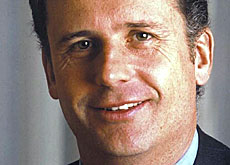Hildebrand urges economic reforms

The Swiss National Bank’s newest board member has warned that economic reforms are vital to tackle the time bomb of an ageing population.
But Philipp Hildebrand says such a process might entail short-term “pain”, including rising unemployment as uncompetitive industries are forced to restructure.
He said the best way to sustain Swiss retirement and social welfare programmes was to “invigorate” economic growth.
Hildebrand added that a rise in productivity, leading to higher economic growth rates, was of paramount importance for Switzerland.
Hildebrand was speaking before the Swiss-American Chamber of Commerce in Zurich on Wednesday in his first formal address since joining the central bank’s governing board.
“As the time bomb of demographics continues to tick, it will become increasingly obvious that this [reform] process is not a luxury our society can contemplate. It is a necessity,” he said.
Twin economies
Hildebrand described Switzerland as a country with two economies. And while the Swiss export sector had by and large risen to the challenges of the past 20 years, domestic sectors had to a large extent remained sheltered from competition.
“Much of the non-tradable sector of our economy remains tied up in a structural straightjacket,” he said. “Eliminating this straightjacket or at least unbuttoning it would have wide-ranging positive effects on the Swiss economy.”
With just over a week before Switzerland’s parliamentary elections, he also issued an appeal to the country’s politicians.
“The challenge for our politicians is a formidable one. The political interests that defend the legislative hurdles which distort the domestic sector of our economy and thus undermine our growth potential are deeply entrenched,” he said.
“Never does this become more obvious than during a parliamentary electoral campaign, he added.
Restrictive regulation
He commented that an intricate web of regulatory measures had prevented the product market from functioning according to market principles.
“Examples are numerous. The electricity market remains regionally monopolised; as a result, Swiss enterprises must bear higher electricity costs than their international competitors,” he said.
“In the telecommunications market, the achieved results in the deregulated sector have not been matched on the still monopolised last mile.”
“In the pharmaceutical and in the automotive sectors, parallel imports are still impeded by patent law or tacit collusion rendered possible by weak international cartel laws,” he added.
Breaking the mould
Hildebrand told the Chamber that breaking down the barriers impeding competition in the domestically oriented sectors of the economy had every chance of making monetary policy more effective.
It would also make monetary policy more flexible in its ability to focus efforts beyond the main aim of maintaining price stability.
Turning to growth prospects for Switzerland, Hildebrand said the country would undoubtedly benefit from the improved outlook in the United States.
But he warned that the Swiss growth prospective was curtailed by economic developments in the rest of Europe where there was currently little evidence of a robust and sustainable upswing in economic activity.
“While the Swiss economy therefore remains weak, it is set to strengthen somewhat into the fourth quarter of 2003 and the first quarter of 2004.”
“Improved corporate expectations, a pick-up in residential construction and strengthened financial conditions suggest that the trough of this cycle was reached during the second quarter of 2003,” he said.
swissinfo with agencies
Philipp Hildebrand says domestic economic reforms are “a necessity” to help stimulate economic growth.
He argues that growth is the most meaningful way to tackle the present problems in retirement and social welfare programmes.
Hildebrand says there may be a further reduction in employment in the short term as uncompetitive industries are compelled to restructure.
He sees no threat to price stability in Switzerland at present.

In compliance with the JTI standards
More: SWI swissinfo.ch certified by the Journalism Trust Initiative













You can find an overview of ongoing debates with our journalists here . Please join us!
If you want to start a conversation about a topic raised in this article or want to report factual errors, email us at english@swissinfo.ch.